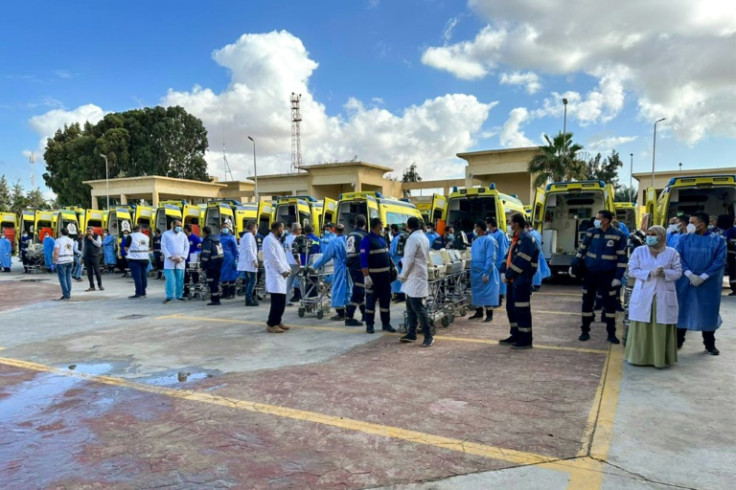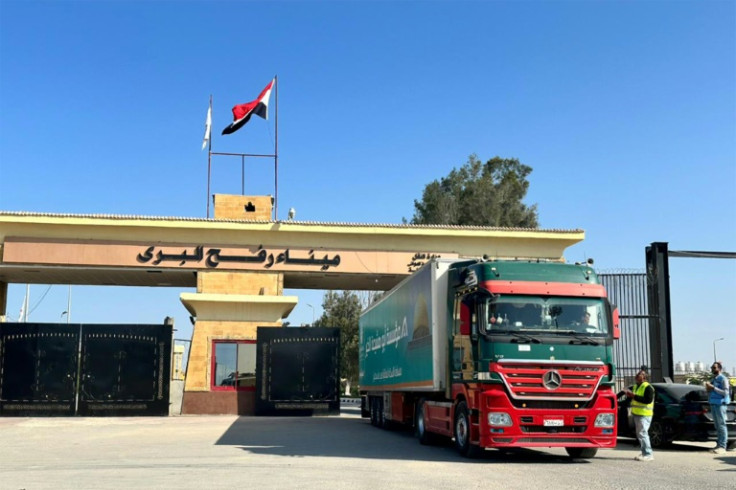
Aid trucks stalled at the Gaza border, hospitals treating missing limbs: UN Security Council envoys visiting Egypt on Monday encountered the fallout of the Israel-Hamas war, days after the United States vetoed a ceasefire resolution.
The informal one-day trip organised by the United Arab Emirates and Egypt came amid a spiralling humanitarian crisis in war-devastated Gaza.
Around a dozen ambassadors took part from countries including Russia and Britain.
But the US, which vetoed the Security Council resolution calling for a ceasefire on Friday, did not send a representative and neither did France.
"Im not sure what the US would have seen today would have been very pleasing for them," Russia's United Nations ambassador Vassily Nebenzia told AFP at the Rafah crossing, the main gateway into Gaza and the epicentre of the humanitarian response.
"They would have seen what is really happening and not what their geostrategic motives are shielding them" from, he added, calling the situation a "catastrophe".
Earlier, the envoys visited a hospital in El-Arish near the Rafah crossing, treating people who had been evacuated from the conflict.
Among those they met was Wafaa Asaad, a 27-year-old from Gaza who was heavily pregnant when her house was hit by an Israeli strike, killing her husband and injuring her two daughters.
She was evacuated to Egypt for medical treatment and had an arm and leg amputated, but miraculously managed to give birth just hours after crossing the border, her sister Alaa told AFP.
"Our message to the UN is we want the war to stop," Alaa said, her newborn niece laying on a bed beside her.
Ecuador's envoy Jose de la Gasca told AFP he was "destroyed" by the visit to the hospital.
"I just met a young mother who lost a kid and has another little girl who is wounded," he said.
"I don't ever want to see again what I have just seen. It's horrible."
The diplomats later visited the Rafah crossing via a stretch of road lined with aid trucks waiting for permission to enter Gaza.
Departures via the crossing are tightly controlled, with only foreign nationals and severely wounded people allowed to leave Gaza in most circumstances.
The entry of aid is also tightly restricted. Only a trickle has entered the coastal Palestinian territory since a week-long truce broke down at the start of the month.
"The trucks, the long line of trucks, I could have never imagined this," said South Korea's incoming envoy who will take up a seat at the council next year.
Monday's trip marked a last-ditch diplomatic effort by the UAE to generate support for a ceasefire ahead of the expiry of its two-year term on the council at the end of the month.
Speaking at the start of the trip, UAE envoy Lana Nusseibeh said it was not official Security Council work, and members were taking part on their own "national and personal" initiatives.
Brazil's envoy Sergio Danese called the visit a "symbolic gesture."
"We are showing interest. We are showing that we are engaged in trying to do something more meaningful... but we need to do more," he told AFP, the black gates and wire-mesh of the Rafah crossing looming behind him.
Philippe Lazzarini, head of the UN's Palestinian refugee agency UNRWA, briefed the envoys on the humanitarian situation before he headed to Gaza for his third visit since the start of the war in October.
There is "deep frustration, disappointment and some outrage... (that) we can't even reach a consensus for a ceasefire," Lazzarini said.
"Hunger is prevailing in Gaza. More and more people haven't eaten for one day, two days, three days... people lack absolutely everything."
The war was triggered when Hamas, the Palestinian Islamist group that runs Gaza, carried out the deadliest-ever attack on Israel on October 7, killing around 1,200 people, according to Israeli figures, and taking about 240 hostages back to Gaza.
Israel has responded with a relentless bombardment and ground offensive that has reduced much of Gaza to rubble and killed 18,205 people, mostly women and children, according to the Hamas-run health ministry.






